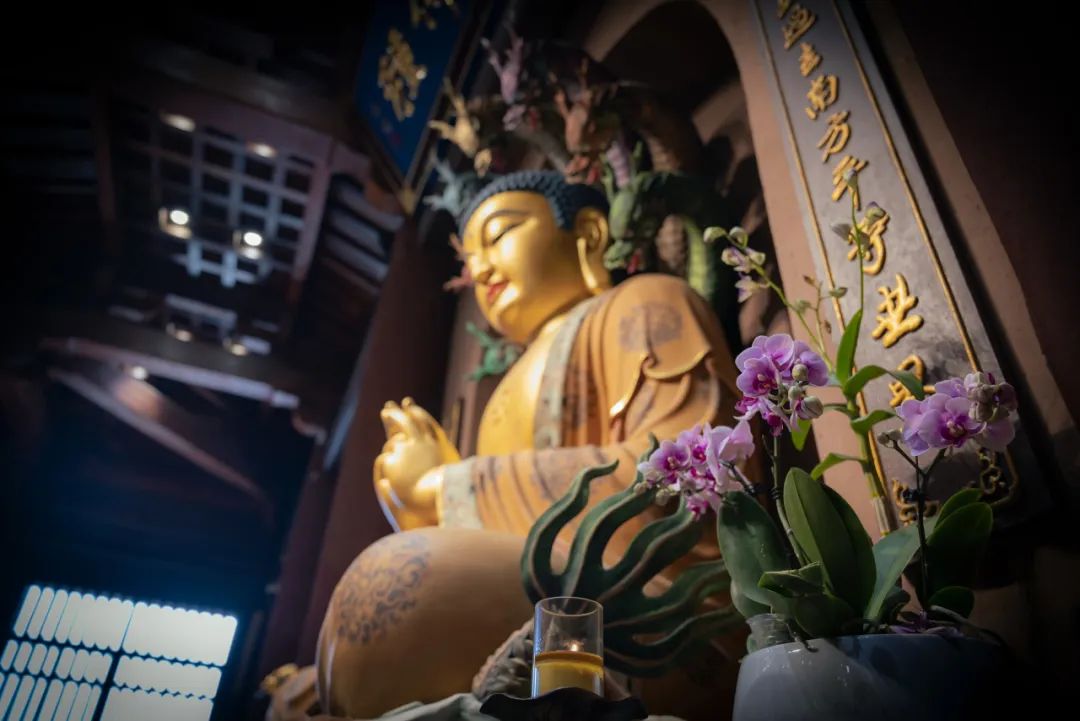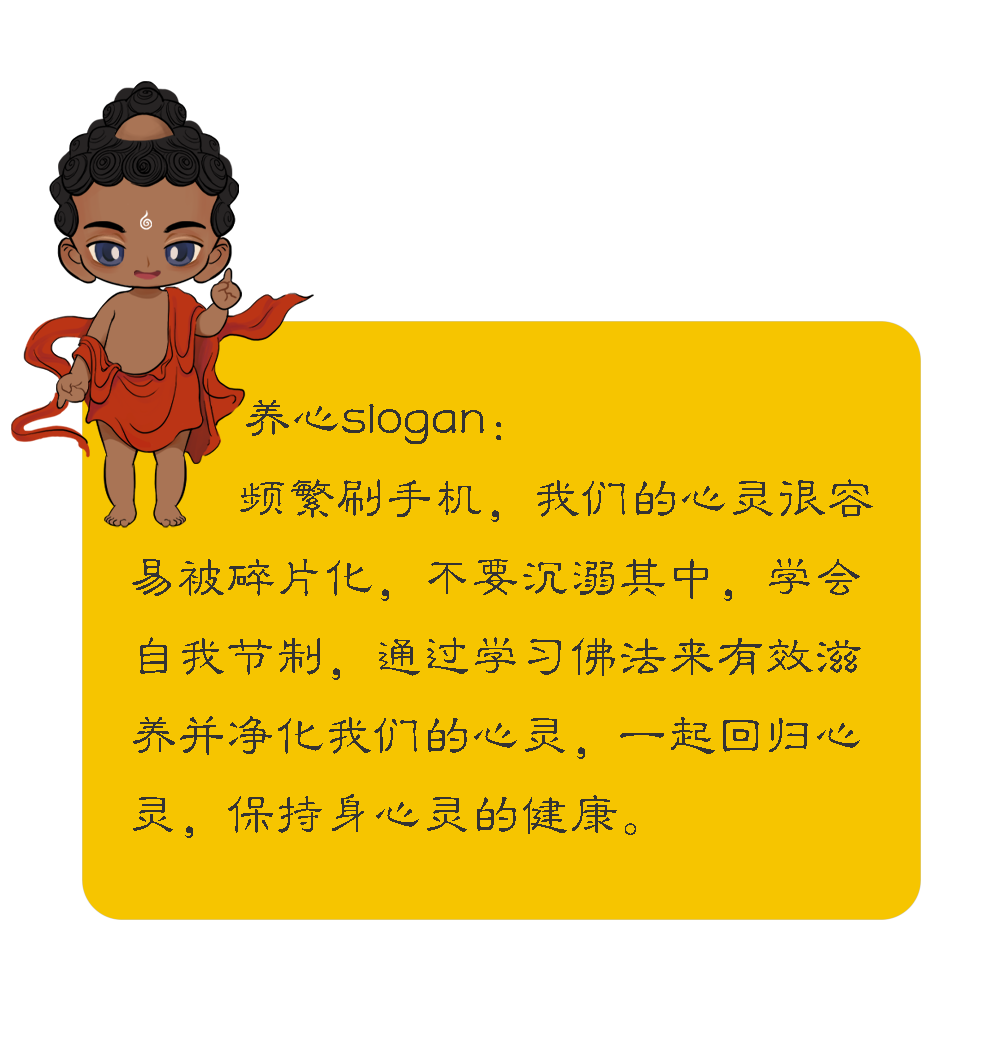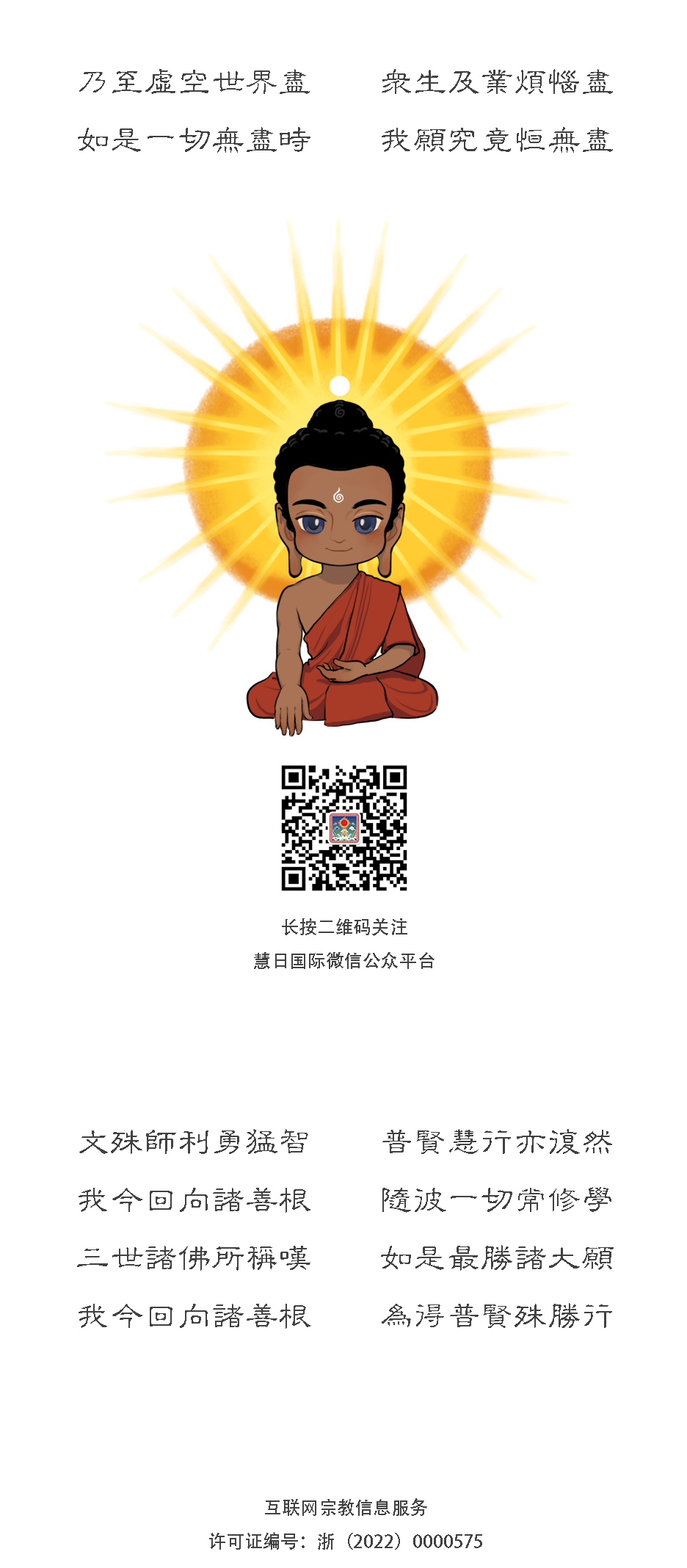越是会修行的人,越是喜欢在逆境中修
越是会修行的人,越是喜欢在逆境中修
Venerable Master Guang Qin: The More Proficient One Becomes at Cultivation, the Greater the Delight in Practising Amidst Adversity

修
行
🍂
我们要在一切的烦恼中好好调理自己,
这是别人无法代替的事,
等调理得当,自然智慧明朗,
无明散去。
We must diligently temper and refine ourselves within all manner of afflictions, regulating our hearts and minds; this is a task no other can undertake on our behalf. When self-cultivation is diligently attended to, wisdom naturally arises with clarity, and ignorance dissipates like mist before the rising sun.
The More Proficient One Becomes at Cultivation, the Greater the Delight in Practising Amidst Adversity

Venerable Master Guang Qin
The Rising Sun
修苦行是从苦中越修越不觉得苦,而且渐渐觉得快乐轻松,并没有感到是在工作,这就是业障渐渐在消,若是越做越觉痛苦烦躁,那就是业障在翻绞。不要以为佛菩萨是多苦,佛菩萨已从苦中磨得业障消除,没有苦感,做什么事都已轻松自在,而不觉得在做什么,也不觉得自己在度众生。
To engage in ascetic practice (dukkha pāramitā) is to persist through hardship until suffering itself ceases to feel burdensome. Gradually, one begins to experience a sense of ease and even joy within the hardship, unburdened by the sense of labour. This signifies that karmic obstructions are gradually being worn away. However, should one feel increasing distress and agitation through practice, it is a sign that these karmic obstructions are being stirred and are not yet resolved. Do not imagine that the Buddhas and Bodhisattvas endure ceaseless suffering; rather, they have refined themselves through hardship until their karmic hindrances have been eradicated. Whatever they undertake, they do so with ease and freedom, engaging in all activities without the notion of doing, nor do they perceive themselves as actively liberating sentient beings.

The More Proficient One Becomes at Cultivation, the Greater the Delight in Practising Amidst Adversity
论人的是非曲直,心里起不平烦恼,那就是自己的错,自己的过失。不去管他是非曲直,一切忍下,自心安之无事,那才对,自己也无犯过失,这是修行第一道,也是最上修道之法。
When the mind stirs with resentment and engages in disputes, perturbed by the rights and wrongs, the faults and merits of others; it is our own error, our own shortcoming. When we abstain from judging such matters, enduring all matters with equanimity so that the mind remains at peace, then we walk the correct path, free from fault. This is the foremost path of cultivation, the first gate, and indeed the highest method of practice.
我们念佛就是要念到花开见佛,什么叫花开见佛?就是凡事要去火性、要忍耐,和颜悦色以道理行之,对人要亲切和蔼,不可一副冷峻的霜脸,令人望之却步,当法师的也要如此才能度众。凡事照道理来,就事论事,不可用烦恼心去应付,对人不论是善人或恶人,都是和气地平等对待,不要去看别人的过错,这样别人对我们印象好,我们心也清爽,照这样做去,心无烦恼,便是花开见佛。
When we recite the Buddha’s name, we aspire to reach the state of “the Lotus blossoms, and one beholds the Buddha.” What is meant by this? It is to quell the fires of temper in all things, to cultivate patience, and to act with a gentle and pleasing countenance, guided by reason and compassion. One must treat others with kindness and warmth, never with a cold and stern visage that causes others to shrink away. Those who serve as Dharma teachers must embody this spirit to guide others to liberation. Whatever the circumstance, act according to reason and principle; respond to each matter as it is, never with a troubled mind. Treat all, be they virtuous or wicked, with equal compassion and courtesy. Do not dwell upon the faults of others. Thus, others will hold a favourable impression of us, and our own hearts will remain light and unburdened. In this way, free from affliction, this is what it means to witness the lotus bloom, and the Buddha is seen.
参学是在参自心,参我们的烦恼心、烦闷心、对人善恶是非的分别心,参我们对一切的境界不起分别,不起烦恼,得无烦恼心、无挂碍心,是心参。
To engage in Chan (Zen) study is to examine one’s own mind—to inquire into the mind of afflictions, the mind of frustration, the discriminating mind that divides people into categories of good and evil, right and wrong. The aim of this practice is to reach a state where, we can encounter all circumstances without allowing discrimination or vexation to arise, until the mind becomes free from such hindrances and afflictions — this is the true inquiry into the mind.
什么事都要学习放下,不要执着,不要样样记挂在心。

In all things, we must learn to let go; to relinquish attachment, to refrain from burdening the heart with every concern.
我们自身的光明要像太阳光一样,对万物一视同仁,无物不照,好人它也照,恶人它也照,好、坏是别人的事,我们总要平等慈悲,若是与人计较,则自身也是半斤八两。
Our own inner radiance ought to be like the sunlight, casting its illumination upon all things equally, without discrimination, shining alike upon the virtuous and the wicked. The deeds of others—whether good or ill—belong to them. Our task is to always practise equality and compassion. Should we descend into contention with others, then we ourselves are but the same as others, no better, no worse.
我们修苦行是在藉各种事境,磨炼我们不起无明烦恼,洗除习气,锻炼做人做事的各种能耐,并不是要做什么劳力事,才叫做苦行,打破对一切顺逆境的分别,就是在修苦行。出家就是要吃苦受苦,只有在苦中才能开发智慧。
We cultivate ascetic practice to utilise all manner of conditions of life, both agreeable and adverse, as a forge to temper our mind against ignorance and affliction, to cleanse away habitual tendencies, and to refine our capacities in conduct and action in our livelihood. Asceticism is not confined to physical labour; rather, it is the breaking down of the discriminations between favourable and unfavourable circumstances. To renounce the lay life and become a monk means to accept hardship willingly, for only amidst hardship can wisdom arise.
修就是要修这些坏的、恶的,这些逆因缘,会启发出我们的智慧与知识,成就我们的忍辱行,让我们处处无挂碍。当我们的智慧发展到某一程度时,就能折服某一程度的烦恼,所以,越是会修行的人,越是喜欢在逆境中修。
Practice entails cultivating the negative, and the harmful — these adverse causes and conditions serve to awaken our wisdom and knowledge, perfecting our practice of forbearance and allowing us to live unimpeded. As our wisdom deepens, so too does our capacity to subdue afflictions at proportional levels. Thus, the more adept a practitioner becomes, the more they embrace cultivating amidst adversity.
什么事都要学习放下,不要执着,不要样样记挂在心。自己了生死,才是要紧的事,不必去理会别人在演什么戏。否则,自己跟着起烦恼,一起堕到三恶道去。
In all things, we must learn to let go; to relinquish attachment, to refrain from burdening the heart with every concern. Our priority is to comprehend and liberate ourselves from birth and death. There is no need to concern ourselves with the drama created by others, for to do so would only entangle us in affliction, and we may fall into the three evil destinies with them.
这个人生就像在演电视剧一样,各人扮演各种不同的角色,剧情发展悲欢离合、喜怒哀乐,看戏的人也随着剧情忽喜忽乐、忽忧忽悲,而这好恶忧乐,也不过是我们自己眼根对尘境,在分别取舍。我们看娑婆世界也是一样,顺境、逆境、善的、恶的,心境随之起伏,而不幸的是,我们的恶习深重,眼根对境,见恶易随,见善难徙,看到恶的,契合自己的恶性习气,就心生欢喜,恣心纵意,随顺而去;而听到佛菩萨的作为,像释迦牟尼佛、观音菩萨、地藏菩萨等,却心生为难,认为那只是佛菩萨们的境界,自己是凡夫,如何效得来,心生退却,对佛菩萨只有空赞叹。结果,好的没学到,坏的却越染越深,这就是本身没有誓愿力的缘故。
This life resembles a theatrical play; each person takes a different role, the plot unfolding with sorrows and joys, partings and reunions, rage and grief. The audience too is swayed by the scenes, now elated, now disheartened, but all this delight and sorrow stems from our own eyes encountering the sensory world, giving rise to discrimination and attachment. So is it with the Sahā world in which we live: favourable or adverse circumstances, good or evil, cause the mind to rise and fall. Tragically, our bad habits are deep-seated—. When our eyes meet with the world, we easily follow the wicked and resist the good; we encounter evil that resonates with our own tendencies and rejoice in it, indulging ourselves without restraint. But when we hear of the deeds of Buddhas and Bodhisattvas — such as Shakyamuni Buddha, Avalokiteśvara, and Kṣitigarbha — we feel disheartened, deeming their realm unattainable, seeing ourselves as mere ordinary beings unworthy of emulation, and so we retreat, offering only empty praise without true aspiration. In the end, we fail to learn the good, yet become ever more steeped in the bad. This is due to a lack of resolve and aspiration.
Whenever joy arises, ask: who is it that rejoices?
如果要练不倒单,先要从淡泊两字开始学起,等到衣食住都能无碍,贪嗔痴也都消灭了,这样子妄念自然消,才能谈到禅定功夫。
If one wishes to cultivate the unshakable meditation sitting posture (budaodan), one must begin by learning simplicity and detachment. When the basic needs of life for food, clothing, and shelter no longer give rise to concern, and greed, anger, and ignorance are eradicated, then deluded thoughts naturally subside. Only then can we speak of true meditative accomplishment (dhyāna).
如遇高兴欢喜,则问是什么人在欢喜?如遇烦恼,则问是什么人在烦恼?
Whenever joy arises, ask: who is it that rejoices? When afflictions arise, inquire: who is it that is afflicted?
凡遇到什么事,皆一句“阿弥陀佛”,高兴也好,烦恼也好,要远离是非,也是一句“阿弥陀佛”,要静下来念佛,念到睡着也很好,一念(一念不生)能超出三界,又一念(念而无念)到西方。修行要眼假装没看到,耳装没听到,老实念佛,现在你们都是眼睛睁大大的,仔细看看。修行要人家愈不认识,愈好修。
In all circumstances, whether in joy or sorrow, respond with a single phrase: “Amitābha Buddha.” To distance oneself from entanglements of right and wrong, again, recite Amitābha. Calm the mind in recitation—even if one recites until falling asleep, this is good. A single thought of non-arising surpasses the three realms; yet a single mindful recitation brings one to the Western Pure Land. In practice, one must feign blindness and deafness, diligently reciting the Buddha’s name. Now, all of you open your eyes wide, scrutinising everything carefully — but true cultivation lies in becoming ever less known to others, for the less one is recognised, the easier the path of practice.
我们打鼓时,念‘公事办,公事办,公事办完办私事’,就是不可人劳我逸,只图自己念佛、拜佛、诵经,这些是属私人的事,若不发心于公事,一味地自私,只顾自己的念佛、拜佛,这样的修持,乃是执我相,心地只有越来越窄,一辈子无法解脱。反之,将身心奉常住,为众人做一切功德,令他人得到利益,这样,虽然没时间拜佛、诵经,但一切的经藏已在其中,则智慧渐开,心胸渐广。

Venerable Master Guang Qin: The More Proficient One Becomes at Cultivation, the Greater the Delight in Practising Amidst Adversity
When we beat the drum, we chant: “Attend to public duties, attend to public duties; once public duties are done, attend to private matters.” This means never let others labour while we idle, engrossed in our personal practice of chanting, bowing, or reciting sutras. This is clinging to the self and leads to a narrowing of the mind, leaving one trapped and never liberated. Conversely, dedicating body and mind to the service of the Sangha and the benefit of all beings—even if there is no time for personal practice—brings the entirety of the Dharma into one’s heart. Thus, wisdom gradually unfolds, and the heart-mind becomes vast.
修行人就是要在这色、声、香、味、触、法的业识顺逆中求解脱。无魔不成道,成佛哪有那么便宜之事,不经苦行,不经魔障,如何去历练无明烦恼?修行人就是在修魔障,唯有冲破魔境中的无明烦恼,方能得到解脱,也唯有舍下色声香味触法,心无挂碍,才能得到清净解脱,才能显出菩提心来。所以,修行人不能怕魔障,不能贪图安定顺境,那样是不会进步的。
A practitioner must seek liberation amidst the karmic consciousness and experiences of the six senses — sight, sound, smell, taste, touch, and thought, in both agreeable or adverse conditions. Without confronting māra (the obstructive forces), there can be no attainment of the Way. Attaining Buddhahood is not a simple matter; without undergoing ascetic practice, without facing demonic obstacles, how can one temper ignorance and afflictions? The practitioner’s path is to refine these very obstacles. Only by breaking through the ignorance and afflictions within demonic realms can one attain liberation. Only by relinquishing attachment to form, sound, scent, taste, touch, and thought, and letting the heart-mind remain free of obstruction, can one realise purity and freedom, and awaken the bodhi-mind. Therefore, the practitioner must not fear hindrances, nor cling to comfort and agreeable conditions — for in doing so, you will impede progress.
我们修行,便是要修六根对六尘所起的分别烦恼,分别善恶、好音坏音种种等,这种分别就是六根不清净。修行就是要修这些分别烦恼,直至六根对六尘没有分别,才是六根清净,才能五蕴皆空。譬如说:别人骂你,那是消灾,给你不好的脸色看,那是“最上供养”,要没有分别,如获至宝。
The heart of practice is to refine the six sense faculties, subduing the discriminations that arise in response to the six sense objects—the judging of good and evil, pleasant and unpleasant sounds, and so forth. These discriminations are impurities of the senses. True cultivation is to transcend these discriminations, until the senses, encountering the world, no longer divide, and thus attain purity, and the realisation of the emptiness of the five aggregates. For example, when others scold you, it is but the dispelling of misfortune. When another offers you a hostile face, it a ‘supreme offering’. To respond without discrimination, as though receiving a priceless treasure — this is the true practice.
——广钦老和尚


END.
